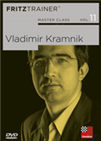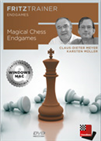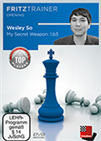Aronian, Fedoseev and Wojtaszek score
 With a new format, the FIDE Grand Prix series was inaugurated on Friday at Unter den Linden in Berlin, with the first of the three legs that will take place over a two-month span. Each event kicks off with a ‘group stage’, in which the 16 participants are divided into 4 pools. The winner of each pool advances to the semifinals, with each group fighting over six days in a double round-robin tournament.
With a new format, the FIDE Grand Prix series was inaugurated on Friday at Unter den Linden in Berlin, with the first of the three legs that will take place over a two-month span. Each event kicks off with a ‘group stage’, in which the 16 participants are divided into 4 pools. The winner of each pool advances to the semifinals, with each group fighting over six days in a double round-robin tournament.
There was plenty of excitement in the first round, as five games were hard-fought struggles. In the end, Vladimir Fedoseev (pool B), Radoslaw Wojtaszek (B) and Levon Aronian (C) were the ones who kicked off the tournament with full points. No decisive results were seen in pools A and D.
 This DVD allows you to learn from the example of one of the best players in the history of chess and from the explanations of the authors (Pelletier, Marin, Müller and Reeh) how to successfully organise your games strategically, consequently how to keep y
This DVD allows you to learn from the example of one of the best players in the history of chess and from the explanations of the authors (Pelletier, Marin, Müller and Reeh) how to successfully organise your games strategically, consequently how to keep yWhile the decisive games were interesting battles, during the opening and middlegame phases, most eyes were put on the game between Vincent Keymer and Daniil Dubov (pool C). The 17-year-old from Mainz entered a sharp position with kings castled on opposite sides, and saw his famed opponent playing critical moves almost at every turn. It was an enthralling fight, with the German missing some (difficult to find) chances, which ended up with Dubov successfully defending a rook and bishop versus rook endgame in a game that lasted close to five hours.
After the exciting battle, Keymer and Dubov will both get the white pieces in round 2. Keymer will face Vidit, while Dubov will play top seed — and group leader — Aronian.

The playing hall
Pool A: Grischuk’s missed chance
While Etienne Bacrot and Hikaru Nakamura signed a draw exactly after 30 moves out of a Berlin Defence, the all-Russian encounter between Andrey Esipenko and Alexander Grischuk saw the latter failing to make the most of a blunder by his young compatriot in the endgame.
White was already on the back foot, with his pieces stuck in the corner, but his 28.Qb1 was a decisive mistake. Grischuk, not surprisingly, though, was in deep time trouble after having spent no less than 48 minutes on move 10!
After spending 48 seconds (not minutes), Grischuk played 28...Nxb4 instead of the killer 28...Nc3. After the latter, White has nothing better than 29.Qb2, when Black can get a dominating position with 29...Qa7+ 30.Kg2 Qe3
Black has a winning position here — for example, after 31.Rc1 pinning the knight, Black can calmly play 31...Rc7 threatening ...Ne4.
None of this was seen on the board, though, as after the text Esipenko created a mating threat with his queen on the long diagonal, prompting Grischuk to force a draw by triple repetition.

Andrey Esipenko and Alexander Grischuk
Pool B: Wojtaszek and Fedoseev win
While fellow late replacement Esipenko had a difficult time in round 1, Wojtaszek could not have asked for a better start, as he defeated the group’s rating favourite on opening day. The Polish star beat Richard Rapport with the white pieces in a hard-fought 58-move game.
 In over 4 hours in front of the camera, Karsten Müller presents to you sensations from the world of endgames - partly reaching far beyond standard techniques and rules of thumb - and rounds off with some cases of with own examples.
In over 4 hours in front of the camera, Karsten Müller presents to you sensations from the world of endgames - partly reaching far beyond standard techniques and rules of thumb - and rounds off with some cases of with own examples.
Wojtaszek had been pushing almost since the start of the game. Rapport gave up a pawn on the queenside to get drawing chances in the endgame, but his experienced opponent showed good technique to convert the diagrammed position into a win — the conversion was not at all trivial, but Wojtaszek took his time when necessary to find the right manoeuvres.
A similar situation was seen in the other game of the group, with Fedoseev converting from a position that was favourable for him since the early middlegame.

Vladimir Fedoseev
Pool C: Aronian in the lead
Much like the winners in group B, Aronian won with white after patiently converting a better position into a full point. However, the most exciting game of the day — and thus of the group — was the sharp battle between Keymer and Dubov.
The German rising star played the novelty 12.Qc2 in an already sharp line, allowing Black to grab a pawn via 12...Rxh2 13.Rxh2 Qxh2. Dubov later noted that he was prepared for this line, as his friend and second Alxander Riazantsev had played 9 moves of this opening against Boris Gelfand a bit over a month ago.
Dubov also mentioned that he was having trouble remembering the details of the variation. In typical style, nonetheless, he went for a sharp continuation on move 18.
Instead of the quiet 18...Kf8 or 18...Rb8, the Russian opted for activity with 18...b4, which allowed both 19.exd5 and 19.Qa4. Keymer chose the latter, and had a quicker access to the opposite king stuck in the centre — albeit his own monarch was vulnerable as well.
There followed 19...Rc8 20.axb4 Bxb4 21.Na2 Be7 22.Bxc4 dxc4
It is difficult to argue against playing 23.d5 here, which is what Keymer did, but the cold-blooded engines show that 23.Rd2 was the best alternative White had in this position. Soon after Keymer’s pawn push the position got somewhat stabilized, with the queens leaving the board on move 26.
The young German still had the upper hand, and played until move 85, as Dubov at some point decided to defend a rook and bishop versus rook endgame. It was a great (not decisive) game by two fighting players!

Daniil Dubov
Pool D: Home preparation
Two short draws left all players in pool D tied on a half point after round 1. Pentala Harikrishna showed excellent preparation with black against Alexei Shirov, while the all-American duel between Wesley So and Leinier Dominguez saw the latter getting an outside passed pawn in an endgame with four knights on the board.
 Meanwhile, 1.b3 has also found its way into the practice of today's world elite, and now finally a modern top ten player has taken on the subject for ChessBase: none other than Grandmaster Wesley So!
Meanwhile, 1.b3 has also found its way into the practice of today's world elite, and now finally a modern top ten player has taken on the subject for ChessBase: none other than Grandmaster Wesley So!
Press officer Michael Rahal asked the contenders if they thought Black had any chances in this ending, and both responded that White should have no trouble holding if Black tries some adventurous plan looking for a win. The game lasted 34 moves.

Leinier Dominguez
Links


















 With a new format, the FIDE Grand Prix series was inaugurated on Friday at Unter den Linden in Berlin, with the first of the three legs that will take place over a two-month span. Each event kicks off with a ‘group stage’, in which the 16 participants are divided into 4 pools. The winner of each pool advances to the semifinals, with each group fighting over six days in a double round-robin tournament.
With a new format, the FIDE Grand Prix series was inaugurated on Friday at Unter den Linden in Berlin, with the first of the three legs that will take place over a two-month span. Each event kicks off with a ‘group stage’, in which the 16 participants are divided into 4 pools. The winner of each pool advances to the semifinals, with each group fighting over six days in a double round-robin tournament.




